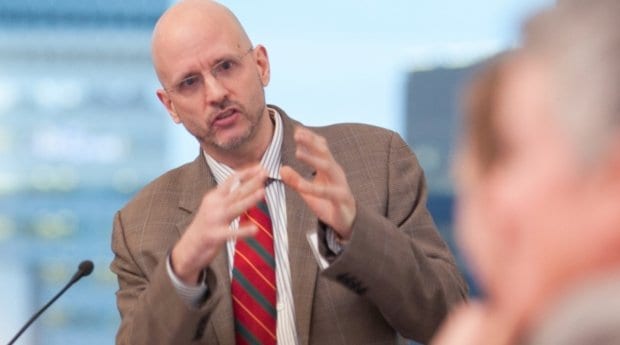The editor-in-chief of New York City’s Gay City News says the size and diversity of the community he serves makes it difficult to summarize in a single term.
“I guess the summary of all that is that I think it’s very, very complicated. I don’t see clear categories here,” Paul Schindler says, when asked what term the community uses to describe itself in New York.
Schindler himself identifies primarily as a gay man, and always has, but says he has no problem with the word queer.
“I probably wouldn’t too often come out and identify myself that way, but I certainly don’t object to that as a way for someone to describe me, and I might occasionally use it as an adjective.”
In his experience, the word queer is more an indication of politics than of age. “People who are looking to tie the way they identify into their politics or politics of community might be more willing to use the word queer,” he says. “Though I know people who are very political who remember it being used very pejoratively against themselves and other people.”
Despite the word gay in the newspaper’s name, Schindler says he tries to represent as broad a cross-section of the community is possible.
“I’m very mindful of my blind spots,” he says. “I am 50-something white gay man, and the community in New York is a lot of folks that don’t look like me.”
The community in Dallas, Texas, is a little more laid-back. “We’re really just not the kind of city that cares that much about what letters we include,” says David Taffet, a longtime writer at the Dallas Voice, the only weekly gay publication in Texas.
Taffet says organizations in the city were slow to adopt “lesbian” into their names and slower still with the rest of the letters, but he attributes this to an understanding of “gay” as including more than just gay men.
“We don’t argue about those kinds of things here that much,” he says.
But that’s not to say anyone goes unrepresented, he adds. “We’re a real organized city. If there’s a something, we have a group. Social groups, political groups, religious groups — we’ve got one here.”
Taffet usually identifies as gay himself, and policy at the paper is to print whatever identifier the interview subject chooses to use.
Nicole Lashomb, editor-in-chief of The Rainbow Times in Boston, calls herself a lesbian but sees the word as just one possible identity under a much broader umbrella.
“In Boston, most people and organizations use LGBTQ, or in some instances GLBTQ or another similar variant of it,” she says. “It cannot go without mentioning, however, that there needs to be more education about this acronym. I have come across many people in various areas of the country that simply do not know what LGBTQ references.”
Rainbow Times publisher Gricel M Ocasio emphasizes the importance of the Q in particular, and not just for the word queer. “The Q is important in Boston because there is a large segment of the community that falls into that category — questioning — and if left out, their needs may fall through the cracks.”
Having spent more than a decade in the Pacific Northwest, living and working mainly in Portland, Seattle and the small college town of Olympia, Washington, Otis Bell has experienced much of the breadth of that Q. He finds the concepts of gender and sexuality to be almost inseparable.
“As far as trans people, my experience is that most people like the word ‘queer’ a lot, because it carves out a space for us that gay or lesbian or dyke or fag don’t,” he says. “Some trans people I’ve known identify as straight but also consider themselves in the queer scene, and that queer is part of their identity,” adds Bell, himself a trans man.
Bell largely credits gender-bending with the rise of the word queer “because it nudged us out of the gender binary,” he says. “People that use it are making a choice to guard our lives from any limitations around gender and sexuality that are presented by the dominant culture. This has had an amazing effect on the newer generation of queers. They are all even more of a gender mashup than we were, and dykes are identifying as fags and fucking femmes, and faggy men are genderqueer dykes, and butch women are into hunky men and on and on.”
Who’s Queer Now?
Watch dailyxtra.com on Wed, June 18, 6:30pm (PST) for a livestream broadcast of our community town hall on the words we use and why they matter.
For readers in Vancouver, join our live audience at the Fountainhead Pub, 1025 Davie St.

 Why you can trust Xtra
Why you can trust Xtra


